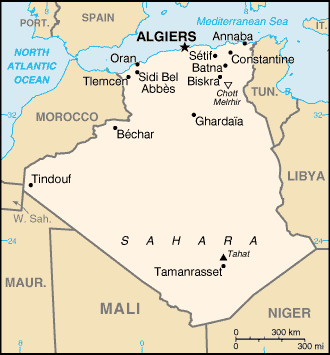Algeria – מילון אנגלי-אנגלי
Algeria
n.
People's Democratic Republic of Algeria, country in north Africa on the Mediterranean Sea (between Morocco and Tunisia)

Algeria
Algeria ( ;
Dzayer), officially
People's Democratic Republic of Algeria, is a country in
North Africa on the
Mediterranean coast. Its capital and most populous city is
Algiers, located in the country's far north. With an area of , Algeria is the
tenth-largest country in the world, and the largest in Africa and the
Arab world. Algeria is bordered to the northeast by
Tunisia, to the east by
Libya, to the west by
Morocco, to the southwest by
Western Sahara,
Mauritania, and
Mali, to the southeast by
Niger, and to the north by the
Mediterranean Sea. The country is a
semi-presidential republic consisting of 48 provinces and 1,541 communes.
Abdelaziz Bouteflika has been
President since 1999.
Algeria
Noun
1. a republic in northwestern Africa on the Mediterranean Sea with a population that is predominantly Sunni Muslim; colonized by France in the 19th century but gained autonomy in the early 1960s
(synonym) Algerie, Democratic and Popular Republic of Algeria
(hypernym) African country, African nation
(member-holonym) Arab League
(part-holonym) Maghreb, Mahgrib
(member-meronym) Algerian
(part-meronym) Algiers, Algerian capital
(class) Armed Islamic Group, GIA
Algeria
nf.
Algeria, country in northwest Africa
Algerìa
n.
Algeria, country in northwest Africa
Algeria
Flag of Algeria

Background
After more than a century of rule by France, Algerians fought through much of the 1950s to achieve independence in 1962. Algeria's primary political party, the National Liberation Front (FLN), has dominated politics ever since. Many Algerians in the subsequent generation were not satisfied, however, and moved to counter the FLN's centrality in Algerian politics. The surprising first round success of the Islamic Salvation Front (FIS) in the December 1991 balloting spurred the Algerian army to intervene and postpone the second round of elections to prevent what the secular elite feared would be an extremist-led government from assuming power. The army began a crack down on the FIS that spurred FIS supporters to begin attacking government targets. The government later allowed elections featuring pro-government and moderate religious-based parties, but did not appease the activists who progressively widened their attacks. The fighting escalated into an insurgency, which saw intense fighting between 1992-98 and which resulted in over 100,000 deaths - many attributed to indiscriminate massacres of villagers by extremists. The government gained the upper hand by the late-1990s and FIS's armed wing, the Islamic Salvation Army, disbanded in January 2000. However, small numbers of armed militants persist in confronting government forces and conducting ambushes and occasional attacks on villages. The army placed Abdelaziz BOUTEFLIKA in the presidency in 1999 in a fraudulent election but claimed neutrality in his 2004 landslide reelection victory. Longstanding problems continue to face BOUTEFLIKA in his second term, including the ethnic minority Berbers' ongoing autonomy campaign, large-scale unemployment, a shortage of housing, unreliable electrical and water supplies, government inefficiencies and corruption, and the continuing - although significantly degraded - activities of extremist militants. Algeria must also diversify its petroleum-based economy, which has yielded a large cash reserve but which has not been used to redress Algeria's many social and infrastructure problems. Algeria assumed a two-year seat on the UN Security Council in January 2004.
Map of Algeria

More about Algeria:
Geography
People
Government
Economy
Communications
Transportation
Military
Transnational Issues






